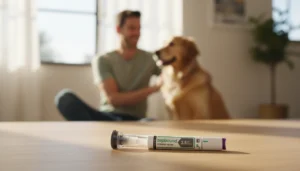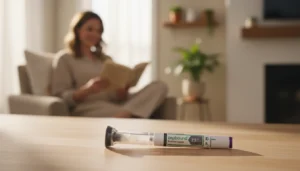How Long Does Zepbound 2.5 Stay in Your System?

When it comes to managing weight, understanding how medications like Zepbound (tirzepatide) work in our bodies is crucial. For many individuals, Zepbound has emerged as a pivotal part of their weight loss journey. However, a common question arises: how long does Zepbound 2.5 stay in your system? This inquiry is not just about the medication's duration in the body; it also reflects the importance of knowing how our bodies metabolize medications and how that impacts our overall health and weight management efforts.
At TrimRx, we deeply value the journey toward healthier lifestyles, and we aim to provide clarity regarding the medications involved in this process. By the end of this blog post, we hope to equip you with comprehensive insights into Zepbound, including its pharmacokinetics, its effects on weight management, and how it fits into a broader weight loss strategy.
Introduction
Did you know that the half-life of a medication can significantly influence how long it remains effective in your body? For Zepbound, this half-life is approximately 5 days, meaning the medication's active effects can linger long after your last dose. Understanding this pharmacokinetic property is essential for anyone considering or currently using Zepbound in their weight loss regimen.
The relevance of knowing how long Zepbound stays in your system extends beyond mere curiosity; it directly impacts treatment adherence, potential side effects, and overall effectiveness. As we dive deeper, we will explore the implications of Zepbound's duration in the system, how it works, and what you can expect during your treatment journey.
In this post, we will cover:
- What is Zepbound?
- How Zepbound Works
- Pharmacokinetics of Zepbound
- Factors Influencing Zepbound's Duration in the Body
- What Happens When You Stop Taking Zepbound?
- Personalized Weight Loss Solutions at TrimRx
- Conclusion and Key Takeaways
- FAQs
By the end of this article, you'll have a clearer understanding of Zepbound's role in your weight loss journey and how to navigate its use effectively.
What is Zepbound?
Zepbound, a brand name for the medication tirzepatide, is part of a novel class of drugs known as GLP-1 receptor agonists. Approved by the FDA, Zepbound is designed to assist adults with obesity or overweight conditions in achieving sustainable weight loss. It works by mimicking the action of natural incretin hormones, which play a vital role in regulating appetite and glucose metabolism.
This medication is administered via subcutaneous injection once a week, making it a convenient option for those looking to manage their weight alongside dietary changes and physical activity. Zepbound has shown promising results in clinical studies, with participants experiencing substantial weight loss over extended periods.
How Zepbound Works
Understanding how Zepbound works can empower you to make informed decisions about your weight loss journey. Once injected, Zepbound activates GLP-1 and GIP receptors, leading to several physiological effects:
- Appetite Suppression: By influencing the brain's hunger signals, Zepbound can help reduce cravings and promote a sense of fullness after meals.
- Increased Insulin Sensitivity: This medication improves the body's response to insulin, which can help in managing blood sugar levels effectively.
- Slowed Gastric Emptying: Zepbound delays the emptying of the stomach, which contributes to prolonged satiety after eating.
These mechanisms work together to create a supportive environment for weight loss, making it easier to adhere to dietary changes and lifestyle modifications.
Pharmacokinetics of Zepbound
The pharmacokinetics of Zepbound sheds light on how long it stays in your system. As mentioned earlier, Zepbound has a half-life of about 5 days. This means that after 5 days, half of the active medication is cleared from your body. Based on this, it can be estimated that Zepbound will remain in your system for approximately 30 days after discontinuation.
Key Pharmacokinetic Points:
- Peak Concentration: After administration, Zepbound reaches peak levels in the bloodstream between 8 to 72 hours.
- Dosing Schedule: Due to its prolonged half-life, Zepbound is typically administered once weekly, making it convenient for users.
- Individual Variation: It's essential to note that the exact time Zepbound remains effective can vary based on factors like metabolic rate, age, body mass, and overall health.
Understanding these pharmacokinetic principles can help individuals manage their expectations regarding weight loss and medication adherence.
Factors Influencing Zepbound's Duration in the Body
Several factors can influence how long Zepbound stays in your system:
- Metabolic Rate: Individuals with a faster metabolism may process medications more quickly, reducing the time that Zepbound remains active in the system.
- Body Composition: Factors like body mass index (BMI) and fat distribution can affect how drugs are absorbed and metabolized.
- Age: As we age, our metabolism can slow down, potentially leading to longer durations for medications to be eliminated from the body.
- Liver and Kidney Function: Since these organs play a critical role in medication clearance, any impairment can affect how long Zepbound stays in your system.
- Diet and Lifestyle: Nutritional habits, hydration levels, and physical activity can influence the body's metabolic processes, impacting medication effectiveness and duration.
Recognizing these factors can help you and your healthcare provider fine-tune your treatment plan, ensuring that you achieve the best possible outcomes from Zepbound.
What Happens When You Stop Taking Zepbound?
If you decide to stop taking Zepbound, it's important to understand the potential implications. As previously noted, Zepbound can take about 30 days to clear from your system after your last dose. Here’s what you might experience:
- Increased Appetite: Without the appetite-suppressing effects of Zepbound, individuals may notice a return of hunger signals, which can lead to increased caloric intake.
- Weight Regain: Studies indicate that many people may regain weight after discontinuing GLP-1 medications, as the appetite regulation that these drugs provide is no longer active.
- Gastrointestinal Effects: Some individuals may experience gastrointestinal discomfort if they restart Zepbound after a significant gap, especially if they resume at a higher dose.
It’s crucial to consult with your healthcare provider before stopping or resuming Zepbound. They can help guide you through the process, ensuring that you make informed decisions that align with your health goals.
Personalized Weight Loss Solutions at TrimRx
At TrimRx, we believe that sustainable weight loss is attainable through personalized care and medically supervised programs. Our approach combines cutting-edge telehealth innovations with effective weight loss solutions tailored to each individual's unique needs.
Our Personalized Weight Loss Program
We offer a range of prescription medications, including Zepbound, as part of our personalized weight loss program. To determine eligibility for these medications, we invite you to take our free assessment quiz. It’s a straightforward process that allows us to develop a customized treatment plan designed for you.
In addition to prescription medications, we provide support that includes doctor consultations, lab work, and unlimited guidance throughout your journey. This comprehensive service ensures that you receive the care and attention you deserve.
If you’re looking for immediate support during your weight loss journey, we also provide quick-access supplements like our GLP-1 Daily Support and Weight Loss Boost. These supplements can complement your weight loss efforts while you explore prescription options.
Conclusion and Key Takeaways
Understanding how long Zepbound stays in your system is essential for anyone considering or currently using this medication for weight management. With a half-life of approximately 5 days and a total duration of around 30 days in the system, individuals can effectively plan their treatment and manage expectations regarding appetite and weight loss.
As you navigate your weight loss journey, remember that each person's experience is unique. Individual factors can influence how Zepbound works and how long it remains effective. Consulting with healthcare professionals is vital to ensure you make informed decisions that align with your health goals.
At TrimRx, we are committed to supporting you every step of the way. If you're interested in personalized weight loss solutions, take our free assessment quiz today to get started on your journey toward a healthier you.
FAQs
How many days does the 2.5 mg Zepbound dose stay in your system?
The 2.5 Zepbound dose stays in your system for approximately 25-30 days until complete elimination from your body. TrimRx educates patients on how long 2.5 Zepbound stays detectable in your system, explaining the extended clearance timeline even at this starting dose.
Does 2.5 mg Zepbound stay in your system as long as higher doses?
Yes, 2.5 Zepbound stays in your system for similar duration as higher doses, with only slight differences in clearance timing. TrimRx clarifies how long 2.5 Zepbound stays present in your system compared to higher strengths, noting elimination timelines remain relatively constant.
When does 2.5 mg Zepbound completely leave your system?
The 2.5 Zepbound completely leaves your system after 4-5 weeks following your last injection at this starting dose. TrimRx tracks how long 2.5 Zepbound stays active in your system until full elimination, preparing patients for complete clearance timelines.
Will I still have effects while 2.5 mg Zepbound stays in my system?
Yes, effects continue while 2.5 Zepbound stays in your system, with therapeutic benefits lasting throughout the medication’s presence. TrimRx explains how long 2.5 Zepbound stays effective in your system, noting continued appetite suppression during this period.
How long after stopping 2.5 mg does Zepbound stay detectable?
After stopping, 2.5 Zepbound stays detectable in your system for approximately one month following the final injection. TrimRx monitors how long 2.5 Zepbound stays measurable in your system, using half-life calculations to determine clearance timing.
Does 2.5 mg Zepbound stay in your system long enough between doses?
Yes, 2.5 Zepbound stays in your system adequately between weekly doses, maintaining therapeutic levels throughout the 7-day interval. TrimRx confirms how long 2.5 Zepbound stays effective in your system, ensuring medication remains active until the next injection.
Can drinking water help 2.5 mg Zepbound leave your system faster?
No, hydration does not affect how long 2.5 Zepbound stays in your system, as clearance follows fixed metabolic pathways. TrimRx clarifies how long 2.5 Zepbound stays present in your system regardless of fluid intake or other interventions.
Will side effects last as long as 2.5 mg Zepbound stays in my system?
Side effects often resolve before 2.5 Zepbound completely leaves your system, improving as you adapt despite medication presence. TrimRx monitors how long side effects persist while 2.5 Zepbound stays in your system, noting tolerance develops faster than elimination.
How long does 2.5 mg Zepbound stay in your system for drug testing?
The 2.5 Zepbound stays detectable in your system for specialized testing for approximately 4 weeks after discontinuation. TrimRx explains how long 2.5 Zepbound stays identifiable in your system through specific assays, though routine drug screens do not detect it.
Does 2.5 mg Zepbound staying in your system affect starting higher doses?
Yes, 2.5 Zepbound staying in your system allows direct escalation to 5 mg since medication accumulates as you increase doses. TrimRx utilizes how long 2.5 Zepbound stays present in your system to plan safe dose escalations with overlapping levels.
Does age affect how quickly the starting dose clears?
Older adults may experience slightly slower clearance, though differences are minimal at standard doses. Age-related changes rarely require significant dosing or timing adjustments for most patients.
Can I switch to a different medication before this dose clears?
Switching requires provider guidance to determine appropriate timing and avoid interactions. Some alternatives can begin during clearance while others require complete elimination first.
Will I lose weight faster while medication remains in my system?
Weight loss rate depends on active therapeutic levels rather than mere presence. As concentrations decline, weight loss typically slows regardless of trace amounts remaining.
Does the starting dose affect long-term medication accumulation?
Starting at lower doses allows gradual buildup, contributing to better tolerance compared to higher initial amounts. This careful accumulation supports safer long-term treatment progression.
Can I measure medication levels through standard blood tests?
Routine blood tests do not measure medication concentration. Specialized assays exist but are rarely used clinically, as symptom monitoring provides adequate treatment guidance.

Transforming Lives, One Step at a Time
Keep reading
Navigating Your Path: How Many Doses Are In Zepbound and What It Means for Your Health Journey
Curious how many doses are in Zepbound? Discover its weekly dosing schedule, available strengths, and titration process for effective weight loss. Learn more!
Navigating Your Zepbound Journey: Understanding Dosing and Expert Guidance
Wondering how to split doses of Zepbound? Learn why it’s unsafe & not recommended. Get expert guidance on Zepbound dosing for safe, effective weight loss with TrimRx. Click to learn more!
Understanding Zepbound Dosing: What is the Lowest Dose Available for Your Weight Loss Journey?
Curious what is the lowest dose of Zepbound available? Learn about Zepbound’s 2.5mg starting dose, titration, and safe use for weight loss. Get expert guidance!



